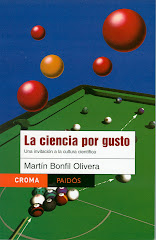Published in Milenio Diario, June 3, 2009
 The science that appears in the media —newspapers, radio, television, the internet— normally takes the form of news, curiosities, entertainment… science as another form of spending time in a pleasant way.
The science that appears in the media —newspapers, radio, television, the internet— normally takes the form of news, curiosities, entertainment… science as another form of spending time in a pleasant way.
And it's ok it's like that. It is good that science is present in our daily life, that we know about it, we enjoy it and understand it.
But there are occasions —as happened with the recent influenza epidemic— in which we suddenly remember that science can be a matter of life or death. And we realize that in Latin America we do not have specialized communicators, capable of handling it and putting it into the reach of the public in a clear, rigorous and reliable way.
Science, unlike other journalism "sources", requires a special preparation, because it does not yet form, unfortunately, part of our citizens' culture . That's why I was conforted when I went to two events that seek to put a remedy to that shortage of science journalists.
The first was the seminar "Science, technology and innovation as news", organized in Acapulco, in the Mexican state of Guerrero, by the Scientific and Technological Consulting Forum, an assessing organism of the executive government, and the Mexican Society for Scientific and Technical Popularization (SOMEDICYT).
As already mentioned by my colleague Horacio Salazar, this gathering of scientific journalists served to realize that we are a few and we're isolated and disorganized, but that we have the potential to form networks and associations to make us more professional and increase our numbers.
The second event was the XI Reunion of the Latin American and Caribbean Network for the Popularization of Science and Technology (RedPOP), in Montevideo , Uruguay, where science communicators from Latin America gathered to share experiences and analyze the challenges.
From both reunions I gather the conviction that our labor is necessary, because the need to democratize scientific knowledge will become more urgent day by day, and that it is worth to collaborate in an academic way to make it advance and improve.
After all, what we science popularizers are here for is to serve the citizens that, with their taxes, pay for scientific research. The challenge is to get scientific culture become popular culture.
(translated by Adrián Robles Benavides) To receive Science for pleasure weekly
in your email, subscribe here!




No comments:
Post a Comment